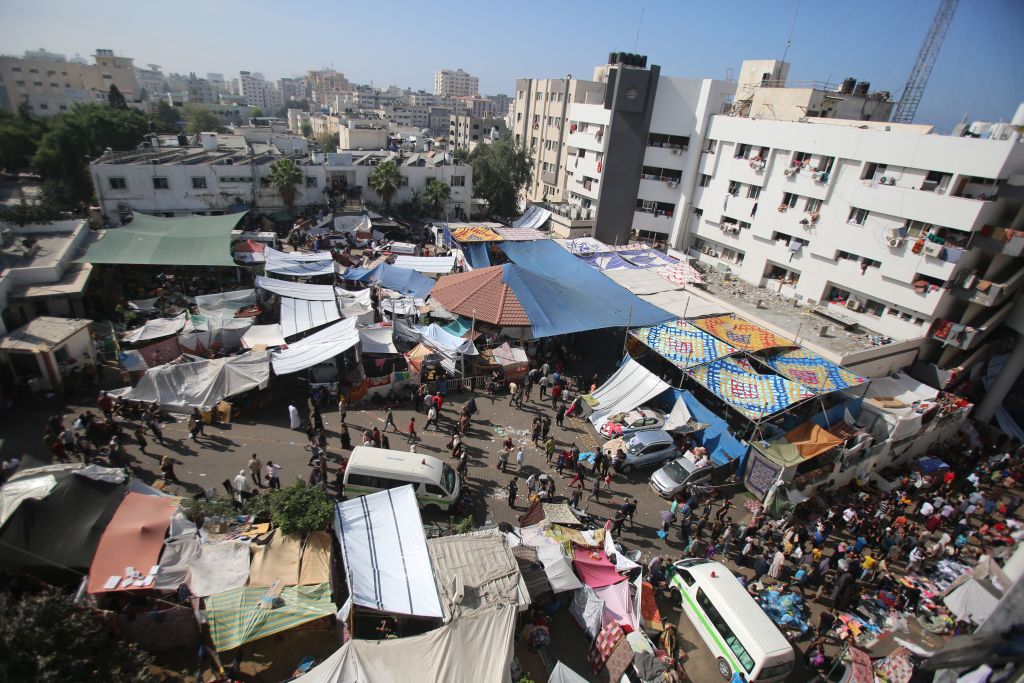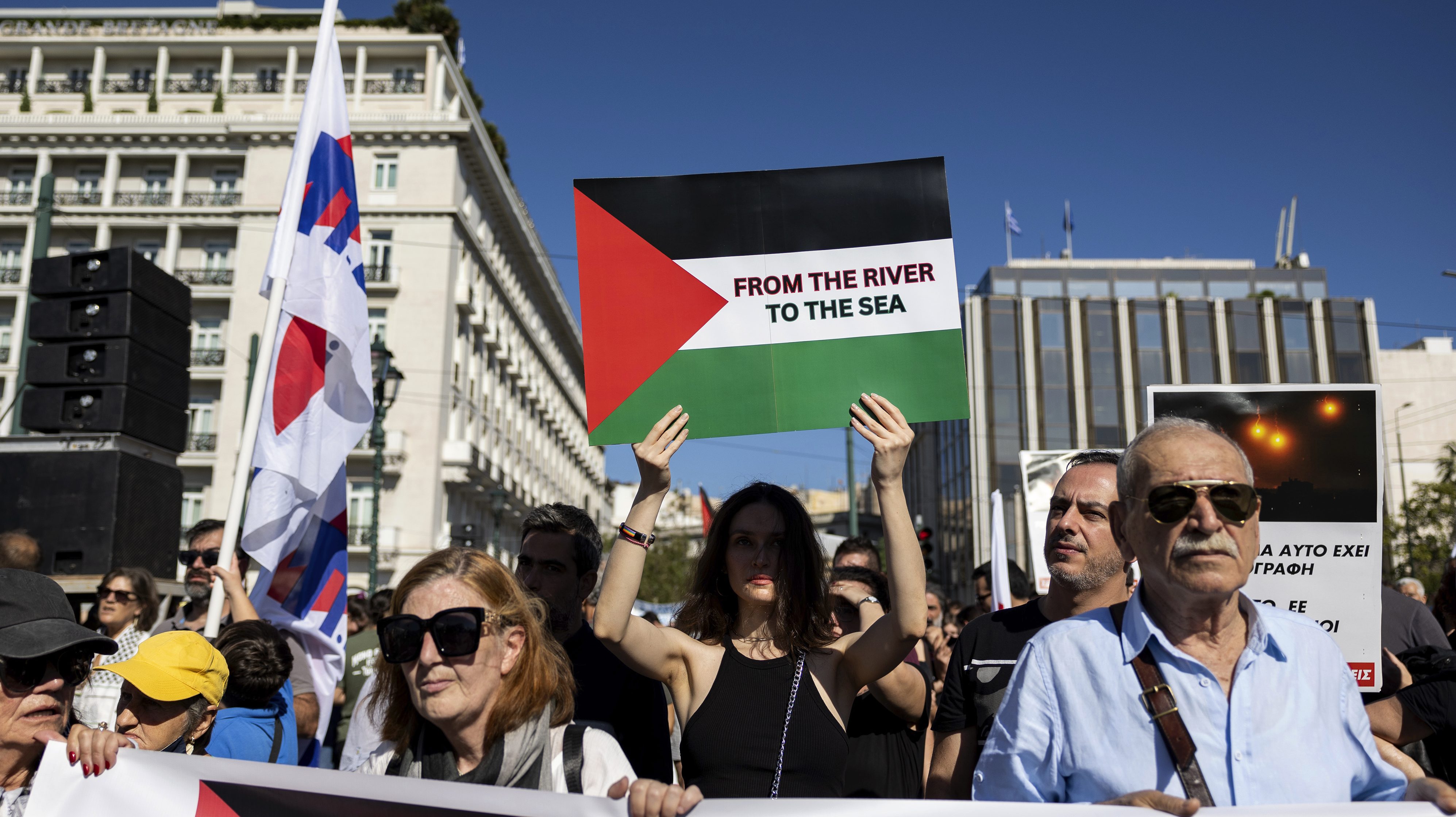
Health officials and people trapped inside Gaza's largest hospital rejected Israel's claims that it was helping babies and others evacuate Sunday, saying fighting continued just outside the facility where incubators lay idle with no electricity and critical supplies were running out.
Prime Minister Benjamin Netanyahu has dismissed urgent international calls for a cease-fire unless it includes the release of all the nearly 240 hostages captured by Hamas in the Oct. 7 rampage that triggered the war.
A day after Netanyahu said Israel was bringing its “full force” with the aim of ending Hamas’ 16-year rule in Gaza, residents reported heavy airstrikes and shelling, including around Shifa Hospital. Israel, without providing evidence, has accused Hamas of concealing a command post inside and under the compound, allegations denied by Hamas and hospital staff.
“They are outside, not far from the gates," said Ahmed al-Boursh, a resident sheltering there.
We've got the news you need to know to start your day. Sign up for the First & 4Most morning newsletter — delivered to your inbox daily. >Sign up here.
The hospital's last generator ran out of fuel Saturday, leading to the deaths of three premature babies and four other patients, according to the Health Ministry. It said another 36 babies are at risk of dying.
US & world news
Israel’s military asserted it placed 300 liters (79 gallons) of fuel near Shifa overnight for an emergency generator powering incubators for premature babies and coordinated the delivery with hospital officials. “Sadly, they haven’t taken the fuel yet,” spokesperson Lt. Col. Richard Hecht said. He said if this fuel doesn’t work, they will seek “other solutions for the babies.”
A Health Ministry spokesperson, Ashraf al-Qidra, told Al Jazeera the fuel would not be enough to operate the generator an hour. "This is a mockery towards the patients and children,” Al-Qidra said.
Speaking to CNN, Netanyahu asserted that “100 or so” people had been evacuated from Shifa and that Israel had created safe corridors.
But Health Ministry Undersecretary Munir al-Boursh said Israeli snipers have deployed around Shifa, firing at any movement.
“There are wounded in the house, and we can’t reach them," he told Al Jazeera. “We can’t stick our heads out of the window.”
The military said troops would assist in moving babies on Sunday. But Medical Aid for Palestinians, a U.K.-based charity that has supported Shifa's neonatal intensive care unit, said transferring critically ill infants is complex. “With ambulances unable to reach the hospital ... and no hospital with capacity to receive them, there is no indication of how this can be done safely," CEO Melanie Ward said.
The only option is for Israel to stop its assault and allow fuel into the hospital, Ward said.
The Health Ministry said there are 1,500 patients at Shifa, along with 1,500 medical personnel and between 15,000 and 20,000 people seeking shelter.
The president of Doctors Without Borders International, Christos Christou, told CBS’ “Face the Nation” it would take weeks to evacuate the patients.
World Health Organization Director-General Tedros Adhanom Ghebreyesus said on X, formerly Twitter, that Shifa has been without water for three days and “is not functioning as a hospital anymore.” Several humanitarian groups told The Associated Press they weren’t able to reach the hospital Sunday.
The Palestinian Red Crescent rescue service said another Gaza City hospital, Al-Quds, is “no longer operational” because it was out of fuel with 6,000 people trapped there. Gaza's sole power plant shut down a month ago, and Israel has barred fuel imports, saying Hamas would use them.
One woman fleeing northern Gaza, Fedaa Shangan, said she'd had a cesarean section at Al-Quds: “The wound is still fresh.” She said the Israeli army near the hospital "did not care about the presence of patients, children, women and the elderly. They did not care about anyone.”
Alarm was growing. “We do not want to see a firefight in a hospital where innocent people, helpless people, people seeking medical care are caught in the crossfire,” President Joe Biden’s national security adviser, Jake Sullivan, told ABC’s “This Week.”
“Decisive international action is needed now to secure an immediate humanitarian cease-fire" amid attacks on health care, the U.N. regional directors of the World Health Organization and others said in a statement, adding that more than half of Gaza’s hospitals are closed.
Muhammed Zaqout, director of hospitals in Gaza, said the Health Ministry has been unable to update the death toll since Friday as medics are unable to reach areas hit by Israeli bombardment.
About 2.3 million Palestinians remain in the besieged territory.
Netanyahu has said the responsibility for any harm to civilians lies with Hamas. Israel has long accused the group, which operates in dense residential neighborhoods, of using civilians as human shields.
EVACUATION WINDOWS, BUT NO PAUSES
The U.S. has pushed for temporary pauses that would allow for wider distribution of badly needed aid to civilians in the territory, where conditions are increasingly dire.
But Israel has only agreed to brief daily periods during which civilians can flee ground combat in northern Gaza and head south on foot along two main roads. Israel continues to strike what it says are militant targets across southern Gaza, often killing women and children.
Hospital officials said at least 13 were killed after an Israeli airstrike in the southern town of Khan Younis.
The war has displaced over two-thirds of Gaza's population.
Wael Abu Omar, spokesperson for Gaza’s border crossings, said 846 people left Gaza to Egypt through the Rafah crossing Sunday. Nearly all were foreigners while a few were patients from Gaza’s hospitals and their caretakers.
He said 76 aid trucks entered Gaza. The U.N. and partners have said much more were needed daily.
Jordanian Foreign Minister Ayman Safadi said on X that he asked European Union foreign policy chief Josep Borrell to apply the same “legal, moral grounds” for EU support of Ukraine to “define its stand on Israel’s war crimes.”
More than 11,000 people, two-thirds of them women and minors, have been killed in Gaza since the war began, according to the Health Ministry in Gaza, which does not differentiate between civilian and militant deaths. About 2,700 people have been reported missing.
At least 1,200 people have been killed on the Israeli side, mostly civilians killed in the initial Hamas attack. Forty-six Israeli soldiers have been killed in Gaza since the ground offensive began.
About 250,000 Israelis have evacuate d from communities near Gaza, where Palestinian militants are still firing barrages of rockets, and along the northern border with Lebanon.
NETANYAHU REJECTS U.S. POSTWAR VISION
Netanyahu has begun to outline Israel’s postwar plans for Gaza, which contrast sharply with the vision of the United States.
He said Gaza would be demilitarized and Israel would retain the ability to enter Gaza freely to hunt down militants. He rejected the idea that the Palestinian Authority, which administers parts of the Israeli-occupied West Bank, would at some stage control Gaza.
Secretary of State Antony Blinken has said the U.S. opposes an Israeli reoccupation of Gaza and envisions a unified Palestinian government in Gaza and the West Bank as a step toward a Palestinian state, long opposed by Netanyahu’s government.
The war threatens to trigger a wider conflict, with Israel and Hezbollah militants in Lebanon trading fire along the border. Attacks by Hezbollah on Sunday wounded seven Israeli troops and 10 others, Israel’s military and rescue services said.
Tens of thousands of people marched in Paris on Sunday to protest against rising antisemitism. And in Tel Aviv, several hundred women gathered to seek the return of hostages taken by Hamas.
___
Magdy reported from Cairo. Associated Press writers Amy Teibel in Jerusalem, Kareem Chehayeb in Beirut Abby Sewell in Beirut contributed to this report.



